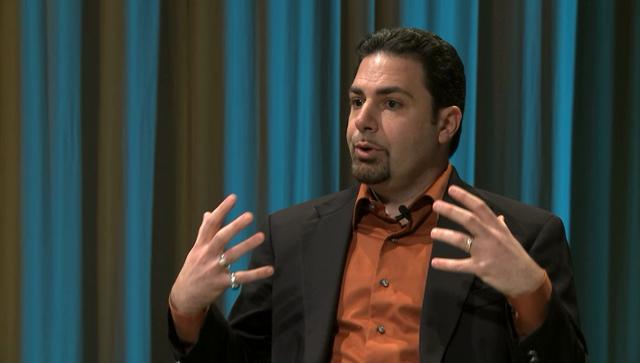 In Western culture, Jesus of Nazareth remains the ultimate Rorschach test. Authors, common folk, popes, and skeptics have all looked at the shape of his life, ministry, and teachings and reached different conclusions about what it all means. A few examples:
In Western culture, Jesus of Nazareth remains the ultimate Rorschach test. Authors, common folk, popes, and skeptics have all looked at the shape of his life, ministry, and teachings and reached different conclusions about what it all means. A few examples:
bill-o-reilly-national-geographic-continue-relationship-with-killing-jesusFox News pundit and author Bill O'Reilly (a practicing Catholic) and co-writer Martin Dugard say their new book Killing Jesus offers an "accurate account of not only how Jesus died, but also the way he lived." They claim Jesus was executed because he clashed with Rome over taxes.
In his new bestseller, Zealot: The Life and Times of Jesus of Nazareth, Reza Aslan—a former Muslim who converted to Christianity before converting back to Islam—wants us to "question our most basic assumptions about Jesus of Nazareth." Aslan says Jesus was a failed messiah who preached revolution and, not surprisingly, died for it.
Dan Brown, supposedly relying on various Gnostic gospels, said Jesus was a mere man who married Mary Magdalene. In The Da Vinci Code, Brown said Emperor Constantine's political muscle was a key factor in the Western church seeing Jesus as God's Son.
In a recent interview with an atheist journalist, Pope Francis appeared to soft-pedal Jesus' exclusive claims about himself. The pope dismissed "proselytism," saying, "Each of us has a vision of good and evil," and stated, "The Son of God became incarnate in the souls of men to instill the feeling of brotherhood. All are brothers and all children of God."
Avoiding the Central Claim
These voices—and countless others down through the centuries—clearly differ on who Jesus was and what he came to do. But they are united in this unfortunate tendency to misdirect our attention from Christ's central claim about himself and what he calls us to do in response. Jesus made this one, central claim at various times during his ministry. Here are two examples:
Jesus said to him, "I am the way, and the truth, and the life. No one comes to the Father except through me. If you had known me, you would have known my Father also. From now on you do know him and have seen him." (John 14:6-7)
"And I tell you, everyone who acknowledges me before men, the Son of Man also will acknowledge before the angels of God, but the one who denies me before men will be denied before the angels of God." (Luke 12:8-9)
These claims, found in the Gospels, shock our postmodern sensibilities. Jesus, the only way? How exclusive! And how rude! There's only about one thing most people outside the Christian community agree on when it comes to Jesus: He is not actually Lord, in the sense of being God incarnate and the ultimate Decider of our eternal destinies.
The Stakes
What is at stake? Only life and death. Nothing more. This is why sub-biblical portraits of Jesus are so problematic. For instance, Reza Aslan perpetuates one of the more pernicious fallacies when he writes, "The Gospels are of course extremely useful in revealing how the early Christians viewed Jesus. But they do not tell us much about how Jesus viewed himself." If, as Aslan suggests, the Gospels do little more than convey the religious views of early Christians, then we who seek to live by God's Word have a serious problem.
The famous trilemma of C. S. Lewis helps us see the stakes afresh. Though some have taken issue with Lewis on logical or philosophical grounds, his trilemma continues to compel us to focus on the true, central claim that Jesus is Lord, the sovereign King who owns our lives:
A man who was merely a man and said the sort of things Jesus said would not be a great moral teacher. He would either be a lunatic—on the level with the man who says he is a poached egg—or else he would be the Devil of Hell. You must make your choice. Either this man was, and is, the Son of God, or else a madman or something worse. You can shut him up for a fool, you can spit at him and kill him as a demon or you can fall at his feet and call him Lord and God, but let us not come with any patronising nonsense about his being a great human teacher. He has not left that open to us. He did not intend to.
Ultimately, we all must decide what to do with Jesus of Nazareth. Was he an anti-tax activist? Failed revolutionary? Someone seeking to teach the universal brotherhood of mankind? A devil? Or our Lord and God? If the last option, then he not only claims divinity but also makes a claim on all of us.
For the unbeliever, Jesus claims ownership. Demonstrating his great love by dying on a Roman cross, Jesus calls on everyone to bend the knee or face the eternal consequences. For the believer, one who has already bent the knee, Jesus claims lordship.
Whatever the world may claim about him on any particular day, Jesus' central claim about himself is the last word. May it be so in our lives as well.
Chris Castaldo serves as director of the Ministry of Gospel Renewal for the Billy Graham Center at Wheaton College. He is the author of Holy Ground: Walking with Jesus as a Former Catholic. He earned an MDiv at Gordon-Conwell Theological Seminary and is completing a PhD at the London School of Theology. He blogs at www.chriscastaldo.com.
http://thegospelcoalition.org/blogs/tgc/2013/10/15/the-central-claim-of-jesus/





















